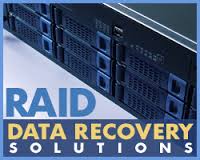Data Raid/Recovery
RAID recovery is the process of data recovery from a RAID array which failed for whatever reason, may it be a controller problem, member hard drive failure, or something else. Redundant Array of Independent (originally Inexpensive) Disks (RAID) storage has revolutionised enterprise data storage technology, building in the peace of mind of redundancy (from RAID 1 & above) which can greatly minimise downtime suffered due to individual drive failures. Unfortunately though, RAID storage isn't a perfect technology and as a result data loss can still occur.
Difference betweeen file recovery and RAID recovery:
File recovery software aims to recover data from the broken filesystems and the result of data recovery is files and folders. The goal of RAID recovery is to find out the lost RAID configuration parameters.
Why RAID recovery?
Occasionally, it is obvious there is a RAID malfunction. An extreme case will be a RAID controller cards with noticeable burnt elements, for which often no replacement can be purchased. Or, the RAID controller stories a double harddrive failure in a RAID5 and refuses to bring the actual array on the web.
There are generally other cases when the RAID recovery is not needed. Above all, the RAID recovery is not needed when there was clearly no RAID. Surprisingly, the RAID recovery is not needed to get a RAID1 (mirror). Hand mirror just keeps two identical copies involving data. Put either with the hard drives in the working unit and data ought to be readily available. In the actual worst scenario, you'd will need ReclaiMe Document Recovery, but not any RAID recuperation is ever needed for a RAID1.
There are generally however cases when the exact character of sixty not clear. For case in point, a size may will not mount caused by either a filesystem difficulty or a great underlying RAID difficulty. If the actual RAID-related origin with the problem are not positively established, the best is to leave the actual RAID setup the way it is in addition to try the actual filesystem recuperation first. The actual RAID recuperation, which will involve disconnecting the actual drives from your controller, should merely be attempted if the filesystem recovery with the array "as is" is not successful.
Attention: Attempting to recover a RAID without an experienced data recovery specialist could result in permanent destruction of critical data. Due to the highly technical nature of RAID recoveries, an important step to take when choosing a data recovery provider is to ensure that the provider has the capacity to take on large and highly complex recovery jobs. Many data recovery providers do not have enough resources or expertise to handle a successful RAID recovery.
-----------------------------------------------------
More Links:
